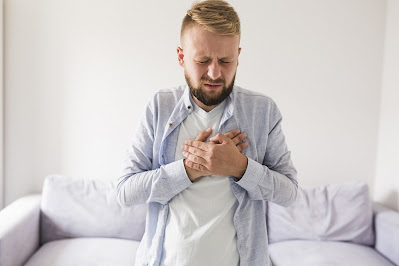Having Heartburn? See what to Do as Self-Care
Heartburn is a burning sensation in the chest caused by stomach acid moving up towards the throat (acid reflux). It causes discomfort. Heartburn can be a symptom of conditions like gastro-esophageal reflux disease (GERD) or pregnancy. It typically feels like a burning in the center of your chest and behind your breastbone. Heartburn can be treated at home using over-the-counter medications.
The main symptoms of acid reflux are:
- Heartburn: A burning sensation that occurs in the chest and can last a few minutes to a couple of hours.
- An unpleasant bitter taste in your mouth is caused by stomach acid.
- a cough or hiccups
- a hoarse voice
- bad breath
- bloating and feeling sick
- difficulty swallowing
Heartburn can be a symptom of conditions like gastro-esophageal reflux disease (GERD) or pregnancy. It typically feels like a burning in the center of your chest and behind your breastbone. Heartburn can be treated at home using over-the-counter medications.
Causes of heartburn and acid reflux
Why heartburn?
When you eat, the food passes down a long tube that connects your mouth to the stomach. This tube is called the esophagus. The lower esophageal sphincter (valve) at the bottom of the esophagus opens to let in food and then closes to keep your stomach contents down.There is a very strong acidic mixture that starts up the digestion process inside your stomach. The stomach is meant to carry this mixture. However, your esophagus is not able to hold this mixture without getting hurt.
Sometimes the lower esophageal sphincter does not close properly, and some of the acidic mixtures from your stomach go back up the esophagus. This is called reflux. When you have reflux, you will often feel the burning sensation and that is called heartburn.
Some conditions can cause reflux and make you feel heartburn and these include:
- Pregnancy: Heartburn and indigestion are very common in pregnant women because of hormonal changes and the baby pressing against the stomach.
- Hiatal hernia: This occurs when the stomach bulges up into the chest.
- Gastroesophageal reflux disease (GERD) is a digestive condition in which the food pipelining is irritated by the stomach acid or bile.
- Certain medications, especially anti-inflammatory drugs like ibuprofen.
- Heartburn can also be caused by eating habits, for instance, certain foods and drinks such as coffee, caffeinated and carbonated beverages, tomatoes, citrus fruits, onions, alcohol, chocolate, and fatty or spicy foods.
- Obesity, excess weight in the abdominal area puts pressure on the stomach. It increases the risk of stomach acids moving back to the esophagus hence causing heartburn.
- Smoking, the nicotine from tobacco, relaxes the lower esophagus sphincter. The relaxation allows the stomach acid and juices (chemicals that break down food within the stomach to reflux into the esophagus, which causes heartburn.
- Wearing tight clothes, tight-fitting clothes squeeze the abdomen hence forcing acid and food into the esophagus.
Occasional heartburn is common and is usually not serious. However, if you've got frequent and severe heartburn, talk to your healthcare provider because this might signify a chronic condition like gastro esophagus reflux disease (GERD). GERD can lead to other complications like esophagitis, Barrett′s esophagus, and even cancer.
Simple changes to your diet and lifestyle that can ease heartburn and acid reflux
- Do not sleep with a full stomach. Eat meals at least three to four hours before you lie down so that your stomach gets time to empty and reduce the chance of experiencing heartburn overnight.
- Avoid overeating. Cutting back on the dimensions of your portions during meals can help lower your risk of heartburn. You can also try eating small meals at different times.
- Slow down while eating. Eating slowly often helps prevent heartburn. So avoid eating too quickly.
- Wear loose-fitting clothes. By replacing your wardrobe with loose-fitting clothes, you would possibly be able to prevent having heartburn.
- Avoid eating certain foods. For many people, certain foods trigger heartburn, and avoiding them can help. Try keeping a log of those foods so that you'll be careful for them in the future and avoid taking alcohol.
- Maintaining a healthy weight. Losing weight without underlying conditions can often help relieve heartburn.
- Quit or do not think of smoking. Nicotine can weaken the lower esophageal sphincter. Not smoking is okay for general health, as well as the strength of this valve.
- Raise the top of your bed so that your head and chest are above your feet. Place 6-inch blocks or books under the bedposts at the head of the bed.
- Plan your exercise to avoid heartburn. Wait a minimum of two hours after a meal before exercising. If you work out immediately, you'll trigger heartburn. Drink plenty of water before and throughout the exercise. Water aids digestion and prevents dehydration.




Comments
Post a Comment